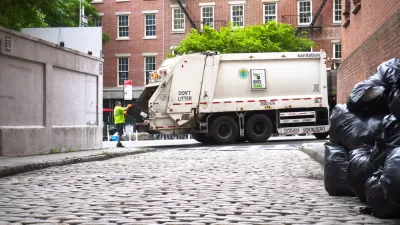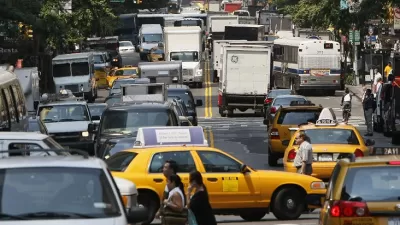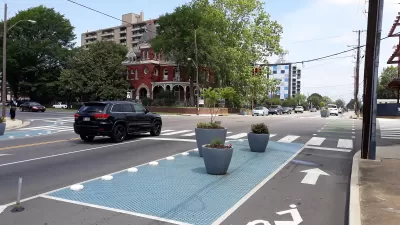Tired drivers working long hours in damaged trucks makes private garbage collection a dangerous business.

Last year, private sanitation trucks killed seven people in New York. Waste collection in the city can be particularly dangerous on the private side of the business, because of the many hours drivers are expected to work and the often poorly-maintained equipment they operate. "Working 10- to 14-hour days, six days per week, means that no one is ever anything close to rested," Kiera Feldman reports for ProPublica. "After working a double shift that lasted nearly 23 hours in August 2016, Queens County Carting driver William Bonds was fired after refusing to work another double shift less than two days later," Feldman writes.
Public sanitation trucks haven't caused a death since 2014, likely because the working conditions are safer for drivers working for the city.
When Feldman found a driver who let her ride with him, she discovered that he had sustained multiple work-related wounds, his truck lacked a gas cap, and he and his helper had to provide their own gloves. "He wore a blue and white striped polo shirt, and neither he nor Caban wore reflective vests — they said #1 Waste hadn’t provided any safety equipment. Workers say that’s common in the industry," Feldman wrote.
One measure that might make garbage collection safer in the city would be to divide the city into zones. Routes that zigzag around the metropolis cause drivers to make long halls regularly, blowing through red lights to try to finish quickly. Companies could be forced to work within certain zones of the city, as they are in Los Angeles and other cities, but the industry’s lobbying has effectively stopped these regulations from passing. "Today, again, zoning has the support of the de Blasio administration but legislation has yet to be introduced in the City Council — and the industry is still resisting. In 2016, the haulers launched NYRWM, which has spent $298,000 lobbying city officials," Feldman reports.
FULL STORY: Trashed: Inside the Deadly World of Private Garbage Collection

Alabama: Trump Terminates Settlements for Black Communities Harmed By Raw Sewage
Trump deemed the landmark civil rights agreement “illegal DEI and environmental justice policy.”

Planetizen Federal Action Tracker
A weekly monitor of how Trump’s orders and actions are impacting planners and planning in America.

The 120 Year Old Tiny Home Villages That Sheltered San Francisco’s Earthquake Refugees
More than a century ago, San Francisco mobilized to house thousands of residents displaced by the 1906 earthquake. Could their strategy offer a model for the present?

Ken Jennings Launches Transit Web Series
The Jeopardy champ wants you to ride public transit.

BLM To Rescind Public Lands Rule
The change will downgrade conservation, once again putting federal land at risk for mining and other extractive uses.

Indy Neighborhood Group Builds Temporary Multi-Use Path
Community members, aided in part by funding from the city, repurposed a vehicle lane to create a protected bike and pedestrian path for the summer season.
Urban Design for Planners 1: Software Tools
This six-course series explores essential urban design concepts using open source software and equips planners with the tools they need to participate fully in the urban design process.
Planning for Universal Design
Learn the tools for implementing Universal Design in planning regulations.
Clanton & Associates, Inc.
Jessamine County Fiscal Court
Institute for Housing and Urban Development Studies (IHS)
City of Grandview
Harvard GSD Executive Education
Toledo-Lucas County Plan Commissions
Salt Lake City
NYU Wagner Graduate School of Public Service





























